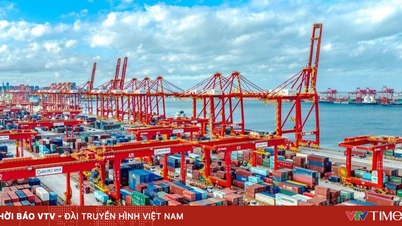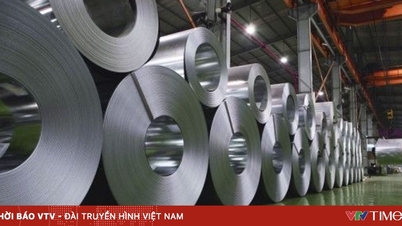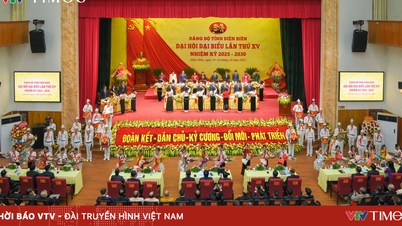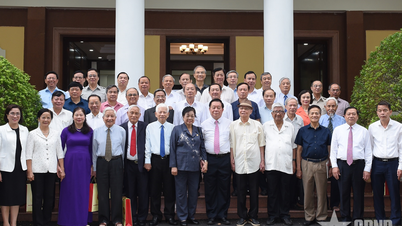
Advantages do not come naturally, businesses must create their own "home field"
The domestic market - with a population of more than a million people and forecast to reach a million next year, has always been considered the key growth driver of the economy . However, the increasingly open door to integration, especially the implementation of tax reduction commitments under free trade agreements (FTAs), has turned the "home field" into an international "playground" with a strong shift of foreign goods. Faced with this fierce competitive pressure, Vietnamese businessmen cannot rely on favoritism from conditions, policies or luck.
Speaking to reporters, Dr. To Hoai Nam - Vice President and General Secretary of the Vietnam Association of Small and Medium Enterprises emphasized this spirit: "Vietnam's domestic market is large enough to become a growth engine... But as Vietnam opens up further, foreign goods are moving in strongly. If Vietnamese businesses do not quickly innovate, the advantage of understanding consumers will not last long." He recommended that Vietnamese businessmen must maintain the spirit of national self-reliance in business, while proactively innovating and digitally transforming, considering this a competitive platform to adapt to new trends.

Vietnam is a strategic market. To maintain its “home turf”, businesses must use technology to overcome competitive pressure from foreign goods and win the hearts of consumers.
In fact, Vietnamese people are willing to spend on Vietnamese products if the quality is good enough. The proof is the revenue of hundreds of billions of VND from Vietnamese films, domestic consumer products and the spread of Vietnamese brands on e-commerce platforms. According to the Ministry of Industry and Trade , the total retail sales of goods and consumer service revenue in the first 9 months of 2025 is estimated at 5,176 trillion VND, an increase of 9.5% over the same period in 2024, in which Vietnamese goods account for a high proportion in the modern distribution system, maintaining around 85% according to the goal of the Project "Vietnamese people prioritize using Vietnamese goods".
Regarding this story, according to Mr. Dau Anh Tuan, Deputy General Secretary, Head of the Legal Department of the Vietnam Chamber of Commerce and Industry (VCCI), Vietnamese enterprises are facing a survival problem, having to use Vietnamese goods and Vietnamese quality to conquer Vietnamese people. When people are proud of and choose domestic goods, the market of millions of people will be the most sustainable driving force.
In that context, according to the Chairman of the Board of Directors of the Vietnam National Textile and Garment Group (Vinatex) - Mr. Le Tien Truong, the domestic market of Vietnam is large enough to become a growth engine, with more than 100 million people and is expected to reach 105 million people in the next 10 years. This is a fertile market, so foreign goods are moving strongly in. If Vietnamese enterprises do not quickly innovate, the advantage of understanding consumers will not last long. Technological innovation is the only way for Vietnamese enterprises to rise out of the "processing loop". According to him, innovative technology not only increases productivity but also creates high added value, helping enterprises no longer just enjoy the value of products. The State must be the one to "activate" the market, and enterprises must be the "creators". To do so, technology must be the center.
Digital transformation: The key for Vietnamese businesses to win with speed and trust
To turn the market of 100 million people into a sustainable advantage, Vietnamese businesses cannot stop at understanding culture but must solve the problem of speed and core values. Economic experts emphasize the application of technology to restructure the value chain. Instead of focusing only on production, artificial intelligence (AI) and big data need to be deeply applied to research and development (R&D) to create unique products that quickly meet local needs.
According to the Ministry of Industry and Trade, by the end of the third quarter of 2025, nearly 70% of medium and large-scale manufacturing and distribution enterprises have applied digital tools in order management, sales and marketing, an increase of about 15 percentage points compared to 2023. From a business perspective, Ms. Nguyen Ngoc Linh - Director of Nam Phong Company Limited said that foreign goods are attacking with global logistics speed and cross-border e-commerce model. For retail systems like ours, I think technology is a real-time supply chain management (SCM) system to reduce operating costs and bring goods to consumers everywhere. This proves that technology is the strategic infrastructure to protect geographical advantages.
In addition, the next strategy that technology brings is the ability to personalize consumer experiences on a large scale. According to Ms. Linh, technology not only helps optimize operating costs but also helps businesses 'read' customers faster and more accurately. Domestic businesses used to be weak in data and marketing, but now, with the support of consumer behavior analysis tools, Vietnamese businesses can completely compete on equal terms with foreign goods.

Vietnamese businesses have the advantage of understanding consumer psychology.
Mr. Le Tien Truong also pointed out that Vietnamese businesses have the advantage of understanding consumer psychology, but need tools to expand that understanding. Applying AI to analyze online shopping behavior is a way to convert cultural advantages into digital competitive advantages.
Sharing the same view, Dr. Nguyen Minh Phong - an economic expert, commented that the domestic market is no longer a 'backyard', but a place to test the creativity of Vietnamese enterprises. Whoever masters the technology, will master the consumers. Mr. Phong believes that the period 2025-2030 will be the "golden window" for Vietnamese enterprises to complete comprehensive digital transformation, because the middle class is growing rapidly and online consumption habits have become popular.
In addition, digital transformation also helps businesses strengthen consumer confidence. "Transparency in product origin and quality is a vital factor when competing with foreign goods. Technologies such as blockchain in tracing the origin of agricultural products or automatic quality management systems in production not only improve quality but are also powerful communication tools, affirming the commitment of Vietnamese goods," Mr. Phong emphasized.
It can be seen that the domestic market of 100 million people is not only a "fence" to protect the economy but also a launching pad for Vietnamese enterprises to affirm their position. According to the representative of the Vietnam Association of Small and Medium Enterprises, Vietnamese enterprises need to change their mindset, not considering technology as a cost but as a strategic investment. The strong transformation in e-commerce, smart logistics, and digital payment platforms is opening up unprecedented opportunities for domestic enterprises. However, for "technology weapons" to truly exert their power, there needs to be practical support policies in terms of capital, human resources, and data infrastructure, while at the same time encouraging enterprises to cooperate and share innovative resources.
Technology is just a tool – the person holding the weapon is the deciding factor. When Vietnamese businesses dare to think big, dare to invest long-term and attach technology to Vietnamese values, victory on the “home field” will not just be a slogan, but the sustainable reality of a self-reliant and innovative economy.
Source: https://vtv.vn/cong-nghe-chia-khoa-de-doanh-nghiep-viet-thang-loi-tren-san-nha-100251014102921216.htm



![[Photo] Conference of the Government Party Committee Standing Committee and the National Assembly Party Committee Standing Committee on the 10th Session, 15th National Assembly](https://vphoto.vietnam.vn/thumb/1200x675/vietnam/resource/IMAGE/2025/10/15/1760543205375_dsc-7128-jpg.webp)

![[Photo] Many dykes in Bac Ninh were eroded after the circulation of storm No. 11](https://vphoto.vietnam.vn/thumb/1200x675/vietnam/resource/IMAGE/2025/10/15/1760537802647_1-7384-jpg.webp)
![[Photo] The 18th Hanoi Party Congress held a preparatory session.](https://vphoto.vietnam.vn/thumb/1200x675/vietnam/resource/IMAGE/2025/10/15/1760521600666_ndo_br_img-0801-jpg.webp)







































































































Comment (0)